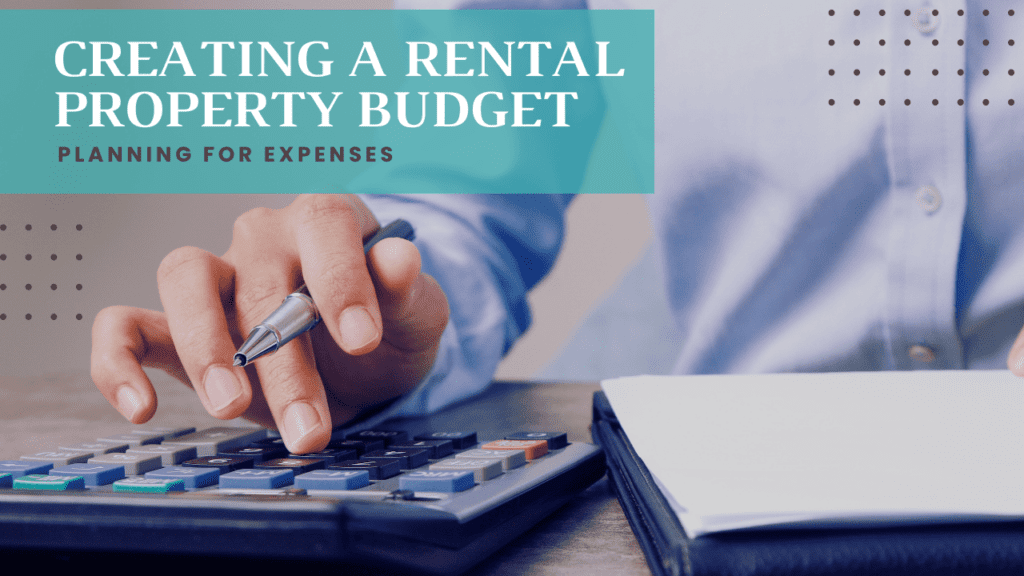
Whether you’re renting out a property with a long-term residential lease or you’re focused on short-term vacation properties, there are going to be expenses that come with your investment. Some of those expenses are fixed and predictable; you know how much your mortgage payment will be, there’s a consistent insurance premium that you pay every month, and you probably know what your monthly pest control bill will be. Other costs are less predictable. These are variable expenses, and they include everything from vacancy to emergency maintenance.
Creating a rental property budget is an important step as you prepare to rent out a home. The expenses will need to be managed, and they’re much easier to manage when you plan for them in advance. You’ll need a reserve, and you’ll need to understand how those expenses compare to the income you’re earning from your rental.
In addition to keeping you on track financially, a well-structured rental property budget can reveal areas where costs can be reduced or efficiencies improved, ultimately increasing what you earn. A clear budget also allows you to plan for future improvements and unexpected repairs, ensuring your property remains attractive to renters.
Let’s focus on the most predictable expenses for your rental investment and share some tips on how to ensure those surprise expenses aren’t devastating to your profitability or your return on investment (ROI).
Expected Costs: The Expenses You Can Easily Budget
When planning your rental property budget, it’s crucial to include all potential expenses, and some of them are easier to anticipate than others. Here’s a breakdown of the major categories you should consider:
- Before You Buy: Mortgage and Financing Costs
The way you finance your investment property will have an impact on the way you budget for ongoing expenses. Assuming you will take a loan or have a mortgage, you’ll have to plan on paying your principal and interest every month as you pay down the debt. Budget for those regular mortgage payments covering the loan’s principal and interest.
Part of your pre-purchase budgeting should also include your anticipated insurance costs. Property insurance is necessary to protect against damage to your property and your own liability. While a long-term tenant can be expected to carry renter’s insurance, your short-term vacation tenants will likely not have their own insurance. You want to make sure all of the available coverage is in place. It’s the best way to protect your property against fires, floods, and other types of damage. You’ll know what your insurance premium is going to be, so this will be easy to budget.
There are also property taxes that need to be included in your rental property budget. Your local government will tax your property based on its value. This is a tax you may be paying annually, semi-annually, or even monthly depending on how you’ve financed and purchased your property.
- Operating Expenses
You will also have to budget for the expenses that pop up during a tenancy. For long-term landlords, your tenants will likely pay for their own utilities. If you’re renting out a short-term property or a vacation home, however, you’ll probably be responsible for paying the electric, water, and gas bills. There will also be internet bills and cable bills. All of these things will be paid monthly, and you’ll want to be prepared for those recurring bills.
While there will be fluctuations in what you spend, it won’t take long for you to notice patterns and to grasp what kind of range you’ll have when it comes to utility bills. In the heat of the summer, the electric bills will likely be higher as the air conditioning is run. If your property is vacant for a month, you might have lower electric and water bills, but the internet bill will remain the same. Keep these line items in your budget whether your property is occupied or vacant.
Property management fees are often a fixed expense. You know you’re paying a flat rate every month or a portion of the income that’s earned in rents. This is easy to budget. Additional professional services may be needed from accountants, tax preparers, or even attorneys. While these are not ongoing monthly costs like your property management fee, you still want to make room in the budget for what you’ll have to pay to these experts as they’re needed.
- Administrative Expenses
What are you spending on things such as toiletries in the bathrooms or supplies in the kitchen? When you leave your guests with plenty of toilet paper, paper towels, trash bags, coffee, tea, bottled water, sugar, and other essentials, you’re paying out of pocket for those things. Make sure they’re in the budget or you might find yourself forgetting to buy them or surprised by the amount of money you’re spending on expenses you didn’t account for. If you like to leave a welcome gift, budget for that.
- Marketing and Advertising
There will be listing fees, and costs associated advertising your property on various sites. You might be paying for additional marketing costs, such as ad campaigns on social media. You’ll know what these are going in, and they’ll generally stay the same unless your marketing efforts shift.
Variable Expenses and How to Budget for Them in Your Rental Property
Budgeting for variable expenses is slightly more complicated than budgeting for those fixed expenses. These are costs that can fluctuate throughout the year, impacting your overall profitability if not managed properly. Generally, when we talk about variable expenses, we’re talking about maintenance and vacancy.
- Budgeting for Maintenance
Your maintenance and repairs will include routine maintenance, preventative services, and also emergency repairs that are unexpected. The more you’re willing to invest in preventative maintenance, the less likely it is that you’ll be responding to expensive emergency calls.
The steps to budgeting for rental maintenance as we recommend them are as follows:
- Assess Current Property Condition
You need to know where you stand right now, so start by conducting a thorough inspection of your property. Identify areas that need immediate attention and those requiring routine maintenance. Create a list of high-priority tasks such as plumbing, electrical systems, roofing, and appliance functionality.
- Estimate Annual Maintenance Costs
To accurately budget for maintenance, calculate the yearly expenses you anticipate. A good rule of thumb is setting aside 1-3% of your property’s value annually for maintenance. Other owners will save 10% of what they collect in rent every month. Find a system that works for you, and consider factors like the property’s age, location, and usage patterns, as these can influence maintenance needs.
- Create a Maintenance Schedule
Develop a schedule outlining when specific maintenance tasks will be performed. Regular activities might include HVAC servicing, pest control, and landscaping. Having a schedule not only helps in timely upkeep but also in spreading costs throughout the year.
- Allocate Funds for Unexpected Repairs
Unexpected issues can arise despite diligent maintenance efforts. Allocate a portion of your budget for unforeseen repairs. This emergency fund will ensure you’re prepared for surprises without throwing off your financial plans.
- Prioritize Preventive Maintenance
This is our mantra. Prioritize preventative maintenance. Investing in preventive measures can save money in the long run. For instance, regularly cleaning gutters can prevent water damage. Integrate these tasks into your routine maintenance to prolong the lifespan of systems and appliances.
- Monitor and Adjust Your Budget
Budgeting is an ongoing process. Regularly review your maintenance expenses to identify trends and adjust your budget accordingly. Utilize software or spreadsheets to track costs and stay organized.
- Budgeting for Vacancy
One of the biggest challenges vacation rental owners face is budgeting for periods of vacancy. If you don’t have a long-term lease in place, it’s hard to know how much of your year will produce income. Unoccupied periods are inevitable, but with strategic planning, they don’t have to cost you too much of your earnings.
To budget, you’ll want to begin by identifying the peak and off-peak seasons for your rental location. This is Florida, and we have vacationers showing up all year long. But some months are more profitable than others, and such knowledge will help you anticipate when vacancies are most likely to occur and plan your budget accordingly.
Collect and analyze historical data so you know when your property tends to earn the most. Identify the most obvious trends and patterns and use this data to forecast future vacancies and adjust your budget based on past performance.
Always have a contingency fund. When unexpected things occur, you’ll be glad you set up a reserve fund for emergencies or unexpected expenses.
Beyond the advice we’ve already provided, we would suggest that you regularly review your financial statements to track income and expenses. Adjust your budget as necessary, taking into account any changes in market conditions or guest preferences.
 You don’t have to budget for your rental property on your own. We would be happy to assist you, especially if you’re renting out vacation homes or long-term residential leases in Anna Maria Island, Bradenton Beach, or any of the surrounding communities. Please contact us at Anchor Down Real Estate & Rentals.
You don’t have to budget for your rental property on your own. We would be happy to assist you, especially if you’re renting out vacation homes or long-term residential leases in Anna Maria Island, Bradenton Beach, or any of the surrounding communities. Please contact us at Anchor Down Real Estate & Rentals.
